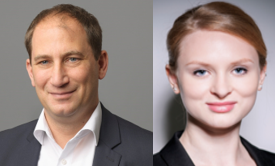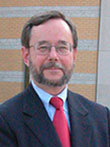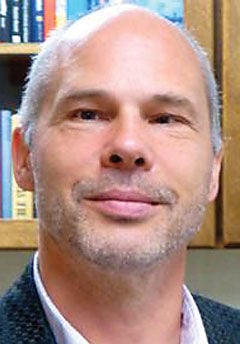McLaughlin College invites the York University community to come and listen to interesting speakers as they share their knowledge on a variety of topics, and enjoy a free lunch. The long-running Lunch Talk Series wraps up November with four events.
Students who attend six or more Lunch Talks throughout the year will receive a Certificate of Participation, while those who attend 10 or more will receive a Certificate of Honour.
The talks take place in the Senior Common Room, 140 McLaughlin College, Keele Campus.
Here’s what’s on the menu:
Nov. 25 – Crisis Management or Hysteria? Policy Reactions to the 2015 Refugee Arrivals in Austria and Germany
Julia Kienast and Constantin Hruschka will present this talk, looking at the policy reactions to refugees arriving in Austria and Germany in 2015.

Constantin Hruschka and Julia Kienast
Kienast graduated from the University of Vienna in 2014 with a general law degree and a specialization in criminology as well as European human rights. From 2015 to 2019, she was employed as a research and teaching assistant in the Department of Constitutional & Administrative Law at the University of Vienna. Kienast has published in the area of migration, asylum and human trafficking, and he co-edited two handbooks on pretrial detention standards for juveniles and on radicalization of juveniles in detention. In the course of her PhD thesis, Kienast is researching sustainable and adequate instruments for the management of mass migration in Austria. Currently, she is an LLM candidate at the University of Michigan in Ann Arbor under the auspices of Fulbright and the Michigan Grotius Fellowship program. Kienast is a member of the German Netzwerk Migrationsrecht, the Viennese Refugee Law Clinic and the Academic Council on the United Nations System, among others.
Hruschka is currently working as a senior researcher at the Max Planck Institute for Social Law & Social Policy in Munich, Germany. In this capacity, he is participating in the Research Initiative of the Max Planck Society on the Challenges of Migration, Integration and Exclusion. Hruschka has previously worked, inter alia, with the Swiss Refugee Council (2014-17) and the United Nations High Commissioner for Refugees (2004-14), and he is a member of the Swiss Federal Commission on Migration. He teaches European asylum law, inter alia, at Bielefeld University. His areas of research include: international and European, German and Swiss asylum and migration law; human rights law; refugee law and refugee rights; integration and social rights; and ethics of migration. Hruschka has extensively published on asylum and migration law, with a strong focus on the common European asylum system and its implementation.
Nov. 26 – The Election Nobody Won: Post-Election Analysis
Four McLaughlin College Fellows will come together to discuss the results of the 2019 federal election, including:




Robert Drummond – University Professor Emeritus of politics, public policy and administration. Drummon is a York alumnus (Ba ’67) and was employed at York for 42 years. He is also a dean emeritus of the Faculty of Arts.
Fred Fletcher – University Professor Emeritus of politics and communications studies. He has conducted many studies in the role of the mainstream media and of social media in Canadian election campaigns.
Dennis Pilon – Associate professor in the Department of Politics.
James C. Simeon (moderator) – Head of McLaughlin College and associate professor in the School of Public Policy and Administration.
This event runs from 12 to 1:30 p.m.
Nov. 27 – The Assessment and Evaluation of ‘evidence’ by Judges in the United Kingdom’s Immigration and Asylum Chamber

Presented by John Campbell, this event looks at the issue of assessing asylum claims heard in the U.K. Among the tasks facing the judges who decide legal claims is the difficult problem of assessing and evaluating the evidence submitted to the court by the parties in the dispute. Campbell will draw on the work of Jones (1994) and Redmayne (2001) on the role of ‘experts’ in the legal process, and the work of Jasanoff (2006) on the limits of scientific evidence in the legal process to examine how British judges assess expert evidence submitted to the United Kingdom Immigration and Asylum Chamber.
Though an examination of decisions in the First Tier Tribunal and in the Upper Tribunal (specifically ‘Country Guidance’ cases), Campbell identifies a number of substantive and procedural problems which arise in the way that immigration judges assess and evaluate evidence which undermines due process and which prevents asylum applicants from securing protection.
Campbell is an emeritus reader in the Anthropology of Law and Africa at the School of Oriental Studies, London. He is also a research affiliate at the Centre for Socio-Legal Studies, Oxford University, and is attached to an ERC-funded project called ‘Euro-Expert’ directed by Professor Livia Holden. In addition to undertaking fieldwork in Ghana, Ethiopia, Tanzania and Botswana, he has undertaken ESRC-funded fieldwork in the U.K. on the British asylum system. He has published numerous papers and several books including Nationalism, Law and Statelessness. Grand Illusions in the Horn of Africa (Routledge, 2014) and Bureaucracy, Law and Dystopia in the UK’s Asylum System (Routledge, 2017).
This event runs from 12 to 1:30 p.m.
Nov. 28 – Political Law – A Very Short Introduction

The 43rd federal general election is now part of Canadian history. The task of scholars and observers is not only to find the right questions to ask about the event, but also to draw the lessons from this process. There can be no doubt that the even was democratic, because voters had freedom of choice leading to self-government. Gregory Tardi will discuss the more profound issues on whether the election was conducted according to the rule of law, following the precepts of the Supreme court, and whether the electoral process met the requirements of ethical behavior of public officials, candidates, political parties and third parties. As no electoral process is ever perfect, we must address what can or should be improved for the next election, that may come sooner than anticipated.
Tardi served for a long time as a lawyer with Elections Canada and the House of Commons. Although currently listed as “retired” from the public service, he maintains his interested in the conduct of public affairs by teaching and writing. His most recent manuscript Anatomy of an Election has just been delivered to a publisher. He is executive director of the Institute of Parliamentary and Political Law and executive editor of the Journal of Parliamentary and Political Law.
This event runs from 12 to 1:30 p.m.


